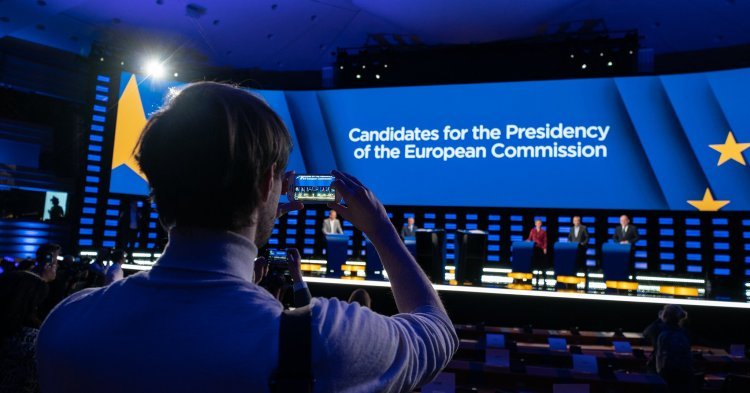The most important debate was on the name of the European Commission President. As the Treaty on the EU (Article 17) says, the European Council should “propose to the European Parliament a candidate”, “taking into account the elections”. Then, the candidate “shall be elected by the European Parliament by a majority of its component members”.
Before starting to complain about or congratulate the decision made by national leaders, let’s focus on what the treaty says. As it is, the EU is a parliamentary system composed of two chambers: The chambers where citizens’ interests are voiced by their representatives (the EP), and the chamber where the member states’ interest prevails (the Council of the EU). The European Commission (EC) is a sort of the ‘government of the EU’.
So, if we look at any other bicameral parliamentary system, there’s nothing special about the EU institutional framework. Apart from the European Council. The European Council is what makes the EU so strange.
Union of national interests
We are not really an international organisation because the EU has its own law which has primacy over member state law. But neither are we a ‘State’ because, even if we have an anthem, shared borders, a flag, citizens, a solid institutional system, a budget and so on, we are nothing but a collective of free nation States that decided to give parts of their power to the EU. The top jobs experience so far has been intergovernmental.
First, we have to underline that Tuesday’s meeting was the last chance to find an agreement before the Parliament would start making its own nominations on the top jobs (namely, for Parliament President). Looking at the treaties, if the European leaders had not agreed that day, we would have entered an even more complex scenario. A new meeting would have been scheduled on the 15th of July and national leaders’ options would have been limited by the Parliament’s earlier choice on its own President.
The European Council did not limit itself to nominating just one name. European leaders had always talked about a ‘package’ which also includes the President of the European Council, the High Representative for foreign policy, and the European Central Bank president. Moreover, they even discussed the Parliament presidency in order to find a balance between geographic composition, gender balance, political parties and nationalities. After the meeting, the current President of the European Council Donald Tusk clearly asked the Parliament to consider a candidate from eastern Europe. (The Parliament instead elected an Italian social democrat.)
Why the struggle?
So why did European leaders struggle so much to find an agreement on the top jobs?
The two main reasons are 1) the lack of a European party system, and 2) the deficiencies of the Spitzenkandidaten system.
A proportional electoral system (though the EU has no proper electoral law) will never give us one single winner as a result. Indeed this is the design of proportional systems: to have proportional representation of society.
That is normal; what is not normal is the party system. Ideally, European parties should compete for seats in the European Parliament. But in the EU this is not easy because a) EU parties do not clearly compete for power, as the Commission is not chosen solely according to the election results; and because b) European-wide parties are weak, suffering limits in terms of campaign finance, lack of power to choose candidates and so on. So the European Council faces a problem as it has to nominate the person who has the ‘right’ to govern the Commission – it’s not a clear-cut choice.
For these and many other reasons, in 2014 we decided to establish so-called Spitzenkandidaten system. A Spitzenkandidat (German for lead candidate) is the party’s main candidate for Commission President. European-wide parties are completely free to join this system or stay out, and they can decide which is the right procedure for them to nominate their lead candidate. There are no common rules about it.
The problem with the lead candidate system, or at least one interpretation of it, is that essentially we insert a presidential feature in a parliamentary system. If we expect that the lead candidate from the party that gets the most seats should automatically become the Commission President, we are no longer in a parliamentary system. Moreover, if a party with, say, 28% of the vote automatically gets the President, how can we claim that’s more democratic than having national leaders propose a candidate with a large majority, and then having the Parliament vote by simple majority?
Solution: Coalitions in the European Parliament
Instead, in a parliamentary system political parties work through coalitions. We should ask European parties to form coalitions in order to have more power over the Commission. If a strong coalition came out of the European elections, leaders would have to deal with that and to respect the will of the citizens. In terms of procedure nothing would change, but in terms of political relevance we would have a stronger-than-ever Parliament.
The Commission should be agreed on based on majorities in the Parliament. Today the exact opposite is happening, as the Parliament has to find a majority for a predetermined Commission candidate. The introduction of the Spitzenkandidaten process was supposed to change that, but it didn’t because of European parties’ weakness.
As we saw, the Parliament suffered a great defeat, as after six months of campaigning with the Spitzenkandidaten, the European Council nominated a non-Spitzenkandidat as their candidate for Commission President. Leaders completely forgot what EU citizens had told them, and the usual complaints about the EU.
So they did what they are used to: the kept the power. Ursula von der Leyen came out after many unsuccessful meetings as the only possible agreement. The message with this nominee to the rest of the EU institutions is “We chose the best possible candidate, don’t waste this opportunity”. Next time, Europe deserves better.



1. On 17 July 2019 at 06:39, by Peter D Gardner Replying to: Fixing the Spitzenkandidaten system for a more democratic EU
Replying to: Fixing the Spitzenkandidaten system for a more democratic EU
Don’t want to be disparaging but this is a facile article. The EU is not at all like other Parliamentary system whether monocsmeral or bicameral. First if all there is no mechanism by which the governing are made accountable to and can be removed by the governed. Second the EU has no demos. Third, the EU, being a supra-national government is inherently anti-democratic. Democracy depends on the nation state and cannot easily be extended beyond the nation state. The EU suppresses the nation state progressively and thereby also suppresses democracy. Fourth, member states are not free. They are subordinate to the law of the EU and have no veto. They cannot override EU law however strongly their Parliament’s resist it and object to it. Fifth the EU parliament, unlike any other in the world has no power to initiate legislation. Sixth, the only EU institution that
2. On 17 July 2019 at 07:58, by Peter D Gardner Replying to: Fixing the Spitzenkandidaten system for a more democratic EU
Replying to: Fixing the Spitzenkandidaten system for a more democratic EU
Fifth or sixth, the only EU institution with the power to introduce legislation is entirely 100% u elected. Parliamentary democracy is nowhere to be found in the institutions of the EU, a thoroughly anti-democratic organisation that, if comparisons must be made with the rest of the world, is closest to an imperial empire. Which is exactly how Commissioner Barosso described it, but you are probably too young to know any of this.
Follow the comments: |
|
